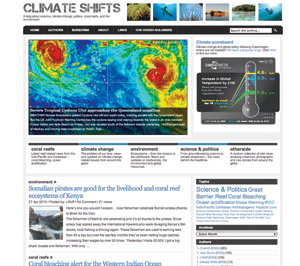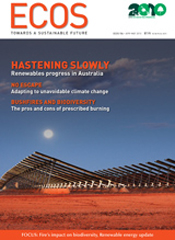
|
Published:
Blogging on climate change – a job for the brave
As Graham Readfearn knows from personal experience, blogging on the polarising and interminably complex issue of climate change is not a job for the faint-hearted. In this review he looks at Australian climate change blogs that are making an impact in the online world.

|
| www.climateshifts.org |
As a journalist for the Courier-Mail in Brisbane, I started the GreenBlog in June 2008 to give readers a more in-depth perspective on environmental issues, especially climate change.
By the time I quit that blog in February 2010, I had written more than 650 posts, moderated about 14 000 comments, blogged live with Prime Minister Kevin Rudd, hosted guest posts from ministers and published a Q&A with former UN Secretary-General Kofi Annan.
I had also monitored the countless daily conversations between the likes of ‘polyaux’, ‘sherlock’, ‘badboybenny’ and ‘PhilM’. I also incurred the wrath of the religious right in the United States who were not too happy with me for writing about a CSIRO scientist who had recommended the use of low-energy Christmas lights!
Blogs are hugely influential in communicating climate change. They are nimble and cheap to run, and they get news, information and new research out fast. Unfortunately, they are also being used to push populist unsubstantiated arguments around the globe quicker than you can say ‘Himalayan glaciers’, ‘climategate’ or ‘Al Gore’.
Everyone from world leading climate scientists at NASA to fossil-fuel lobbyists, journalists, politicians, campaigners, activists and countless other global citizens are writing thousands of posts every day.
Unfortunately, some of the most popular blogs have misrepresented the science – sometimes innocently and sometimes not. However, some scientists are taking up this communication challenge.
Professor Ove Hoegh-Guldberg, director of the University of Queensland’s Global Change Institute, started his blog Climate Shifts after seeing a ‘growing distortion of the information’.
He says: ‘Some of this is simply a consequence of online “experts” being ill informed, while others stem from a well-organised and well-funded disinformation campaign proliferated by special-interest groups who, for example, do not want action on human-driven climate change.’
Tim Lambert, a computer scientist at the University of New South Wales, has seen his blog Deltoid rise to become one of the most popular science-based blogs on the planet.

|
| www.scienceblogs.com/deltoid |
‘Journalists are generalists and not experts and it is very hard for them to get everything right,’ he says. ‘The problem is worse in technical and scientific areas and even worse in an area like climate science where many people want to believe that the scientists have it wrong.
‘Before blogs, I might have complained to a colleague or written a letter to the editor, but in my blog I can explain exactly what they got wrong and provide links to original sources.’
Another Australian-based blog to make global waves is Skeptical Science, created by John Cook, a University of Queensland physics graduate. In recent months, his blog, which uses peer-reviewed science to explore misconceptions about climate change, has been featured on the websites of the Guardian and the New York Times.

|
| www.skepticalscience.com |
‘I’m trying to inform people in everyday language what the peer-reviewed science is telling us about climate change – both through the blog and a free iPhone app we have released.’
The iPhone app is designed to give instant science-based answers to queries on climate change and has been described by one World Wildlife Fund Canada blogger as a ‘pocket-sized miracle’.
‘I have a 10-year-old daughter,’ says Cook. ‘The latest science tells me she’ll see 1 to 2 metres of sea level rise in her lifetime. I want to be able to look her in the eye when I’m an old man and say that although my generation dithered on acting on climate change, at least I tried to change things. That motivates me.’



